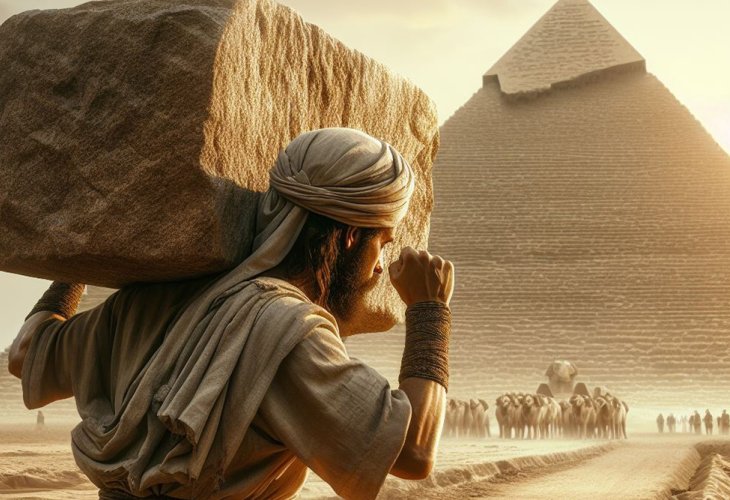Passover
The Real Story: Life for the Israelites in Ancient Egypt
Ancient Egypt was powerful, frightening, and seemingly unstoppable to the enslaved Israelites
 Illustration of a biblical-era man carrying a heavy stone on his shoulder, working on the pyramids
Illustration of a biblical-era man carrying a heavy stone on his shoulder, working on the pyramidsWhen we read the Torah or the Haggadah on Passover, we already know how the story ends. Even children know the basic plot: the Israelites were slaves in Egypt, and Hashem brought ten incredible plagues that led to their freedom.
But to really grasp what they went through, we need to pause and forget the ending for a moment. The Israelites living in Egypt had no idea what would come. They didn’t believe freedom was possible. Egypt wasn’t just any kingdom and it was the most powerful empire in the world, far beyond what we might compare to America today. It was undefeatable. If you were a slave in Egypt, you were considered nothing, lower than low. And Pharaoh wasn’t just a ruler, he was treated as a god, with ultimate control and no one to answer to.
When we learn a bit about Egyptian language and culture, it helps us understand some of the Torah’s descriptions more deeply. For example, when Pharaoh tells the Israelites, “Behold, evil is before you,” it sounds like a simple warning. But our sages explained he was referring to a star named "Ra", not just any star, but a key part of Egypt’s idol worship. Ra was their top deity, the source of their national power. So Pharaoh wasn’t just warning them but he was threatening them with the wrath of his god. It’s easy for us to brush that off today, but back then, it was terrifying.
When Pharaoh says, “I do not know Hashem,” our sages said he looked through his records of all known gods and didn’t find Hashem’s name. This wasn’t just a figure of speech. We now know Pharaoh had a special place called the “House of Life,” where the names of gods were recorded. There were many kinds of deities, and Pharaoh would study them. So when he heard of a new God he didn’t recognize, he truly didn’t know what to make of it.
The Torah often says, “Pharaoh’s heart was hardened.” This isn’t just poetic language. In Egyptian belief, the heart played a crucial role in the afterlife. When someone died, the god Osiris would weigh their heart. If it was heavier than a feather, it meant they were guilty and would be devoured by monsters. If it was light, the person could move on to eternal life. So when the Torah says Pharaoh’s heart was heavy or hardened, it would have been understood by Egyptians as a sign of deep guilt and impending doom. Telling someone their heart was heavy was like saying they were destined for destruction.
Another fascinating detail comes when Hashem tells Moshe (Moses) to go meet Pharaoh by the Nile. Why the Nile? Illustrations show Pharaoh alone by the river, but there’s more to it. In Egyptian custom, any person was allowed to approach Pharaoh in public and cry out, “Save me, O king!” Ideally, Pharaoh was supposed to stop and listen. While this wasn’t always practiced, it was part of their legal tradition. So when Moshe met Pharaoh at the Nile, it was a moment Pharaoh couldn’t easily avoid.
In ancient Egyptian drawings, Pharaoh is often shown with his right arm stretched out to strike his enemies. It symbolized his strength and control. But in truth, before the King of all Kings, Hashem, Pharaoh’s power was meaningless. That gives special meaning to Hashem’s promise to the Israelites: “I will deliver you with an outstretched arm.” And later, they sang, “Your right hand, Hashem, shattered the enemy.” It wasn’t Pharaoh’s mighty arm that ruled, it was Hashem’s.
By learning more about ancient Egypt’s culture, language, and beliefs, we gain a deeper appreciation of what our ancestors endured and the true greatness of their redemption. It wasn’t just a story of leaving slavery. It was a story of Hashem turning the most powerful empire upside down and showing that true strength lies not in earthly power, but in Divine truth.

